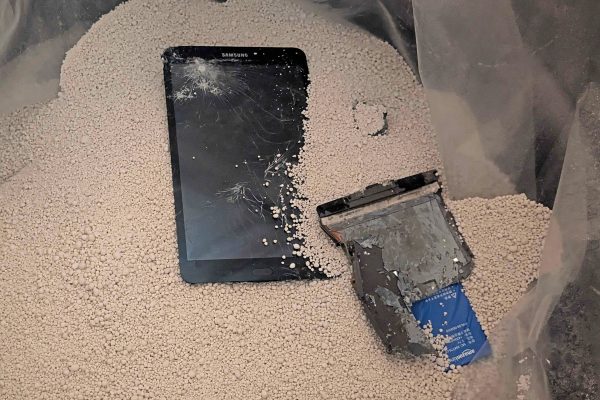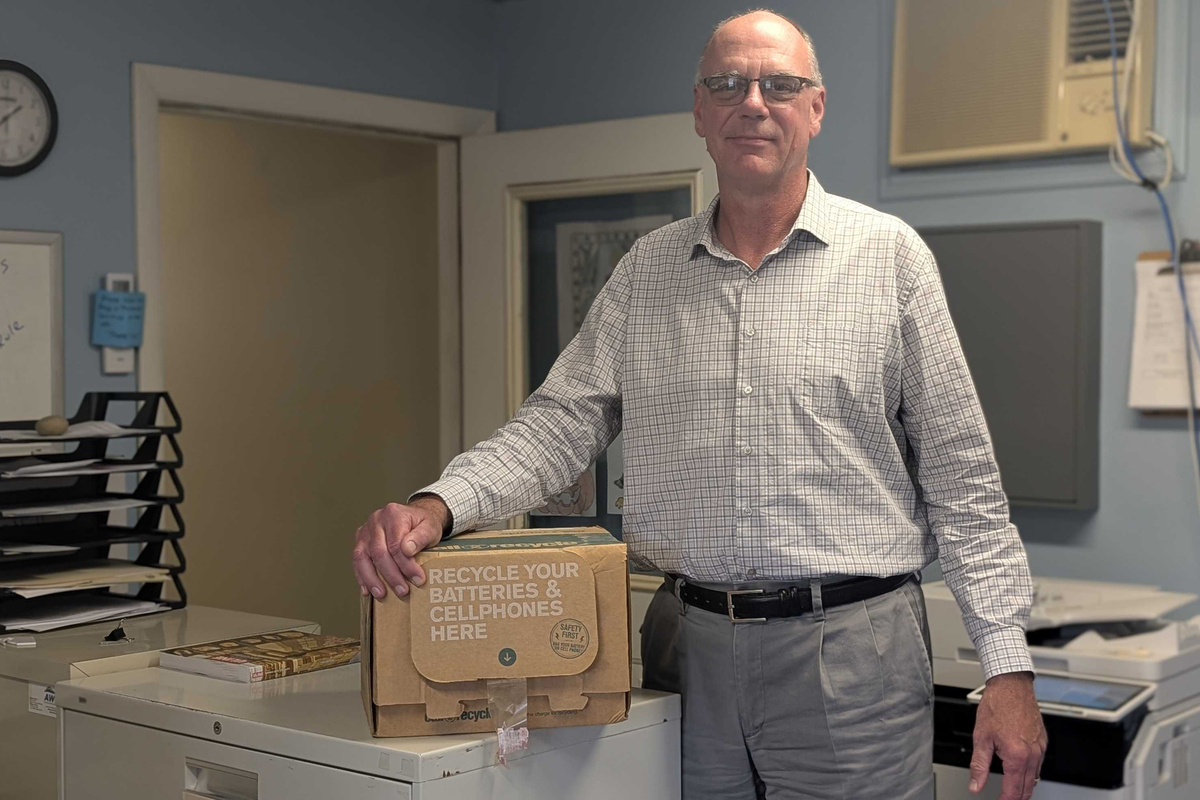When Fort Fairfield launched a lithium battery recycling program last year, the aim was to cut the number of battery-sparked fires at the Tri-Community Landfill.
A year later, the battery fires are still lighting trash ablaze, and the first recycling barrel isn’t even full.
The town started the free community program last September to offer residents an easier option than traveling 8 or so miles to the landfill. But so far, there aren’t many takers.
“We were prepared for a massive response, and we unfortunately haven’t seen that yet,” he said. “But I think primarily the reason people put their batteries in the trash is that they don’t know not to.”
Since the program started, the landfill has had eight battery-related fires. During two of those, fire crews spent days at the site and operations had to be modified temporarily. If more residents recycled their batteries, the landfill staff wouldn’t lose time to fires and the community would be safer, said Mark Draper, solid waste director for Aroostook Waste Solutions, which operates the landfill.
Of the recent fires, six were contained by landfill staff. Two were extinguished by firefighters. When the cause can be determined, it’s almost always a battery, Draper said.
When batteries are punctured, broken or exposed to water, a chemical reaction happens that causes them to heat up rapidly. They will often sputter, and can set fire to what’s around them, Draper said.
 A cellphone and a lithium battery sit in a bin filled with glass beads, which are used as a fire suppressant, at the Tri-Community Landfill in Fort Fairfield on Oct. 23. The town started its own battery recycling program last year. Credit: Paula Brewer / BDN
A cellphone and a lithium battery sit in a bin filled with glass beads, which are used as a fire suppressant, at the Tri-Community Landfill in Fort Fairfield on Oct. 23. The town started its own battery recycling program last year. Credit: Paula Brewer / BDN
The Tri-Community Landfill serves Caribou, Limestone and Fort Fairfield. Aroostook Waste Solutions also manages the Presque Isle Transfer Station.
Lithium, a lightweight, soft metal found in rocks and certain groundwater, can store a lot of energy in a small space. Lithium batteries power everything from electric toothbrushes and cellphones to laptops and scooters.
But if they’re not used and charged correctly, or become damaged, they can overheat, catch fire and even explode, according to the National Fire Protection Association.
The batteries have been blamed for a number of fires across Maine.
Disposable e-cigarettes powered by lithium cells caused a slew of fires at Portland-based waste management company ecomaine a year ago. The batteries were also suspected in a trash fire that burned in Orrington for 10 days in 2024 and in a January blaze that destroyed a Fort Kent garage.
Under current Maine law, manufacturers have to create a collection system for rechargeable batteries. Call2Recycle, a nonprofit that offers free battery collection sites at recycling centers, transfer stations and some businesses in the U.S. and Canada, is that system.
After several landfill fires in 2023 and early 2024, Aroostook Waste Solutions and Fort Fairfield town officials started mulling solutions. They joined a pilot program with Call2Recycle.
Then they designated the Fort Fairfield town office as a recycling point, where residents can simply drop off their used or damaged batteries — everything from small button cells to laptop or scooter batteries. From there they go to the landfill, where they are stored and shipped to Call2Recycle.
In an outdoor shed at the landfill sits a 55-gallon barrel with a heavy cover. Inside, it’s filled with beads made from recycled glass that act as a fire suppressant. Draper uncovers the barrel to reveal a few batteries inside among the beads.
If any reaction happens with one of those batteries, the resulting heat will melt the glass and seal off the battery, eliminating danger, he said.
People should treat the batteries with caution — don’t overcharge, don’t leave them plugged in when you’re away and use only the specified types of chargers. Draper said when used as intended, the vast majority of them are safe.
“We don’t want people to be afraid of the batteries. That’s not our message,” he said. “But don’t put them in the trash.”
Broken batteries could react with liquid in home garbage, but also could pose a danger on sanitation trucks, Draper said. As trash is compacted, the pressure can break batteries, putting the crew and vehicle in danger.
Fort Fairfield residents can drop off used lithium cells at the town office. People in other central Aroostook communities can take theirs to the landfill, Presque Isle Transfer Station or Lowe’s, also in Presque Isle, he said. He realizes options are few right now, but that could change.
Maine wants to revamp its battery management plan to include more manufacturer responsibility, according to the Department of Environmental Protection.
But regulators want to extend the law to apply to batteries that aren’t covered, including those containing lithium. DEP is collecting public input on the law.
Draper said it’s a long process that could take a couple of years to be finalized.
In the meantime, landfill staff are outfitting a truck with a water tank and hose to deal with small fires, and hope to add an after-hours option for battery dropoff.
“We’re trying to expand the convenience of getting rid of them,” he said. “You don’t need to have a permit or anything to bring them to us. We’ll make it as easy as we can.”
